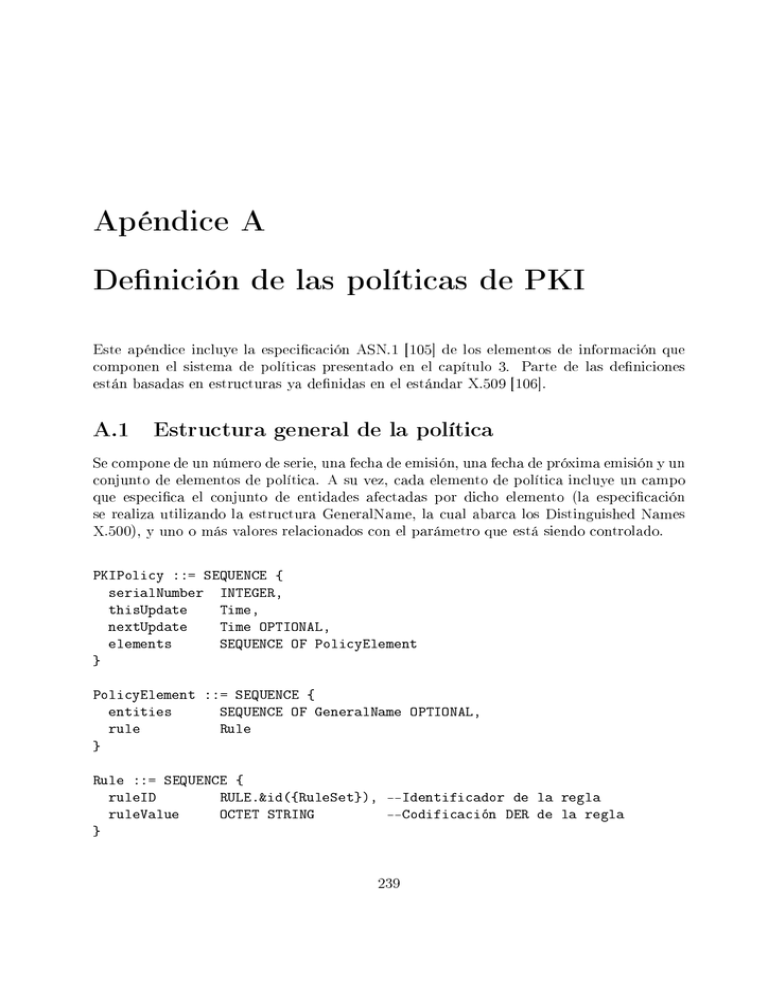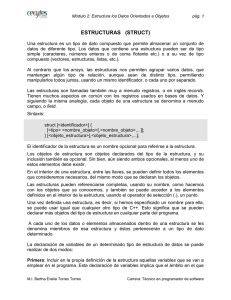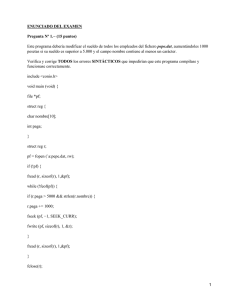ApИndice A Definici n de las polМticas de PKI
Anuncio

Apéndice A
Denición de las políticas de PKI
Este apéndice incluye la especicación ASN.1 [105] de los elementos de información que
componen el sistema de políticas presentado en el capítulo 3.
Parte de las deniciones
están basadas en estructuras ya denidas en el estándar X.509 [106].
A.1 Estructura general de la política
Se compone de un número de serie, una fecha de emisión, una fecha de próxima emisión y un
conjunto de elementos de política. A su vez, cada elemento de política incluye un campo
que especica el conjunto de entidades afectadas por dicho elemento (la especicación
se realiza utilizando la estructura GeneralName, la cual abarca los Distinguished Names
X.500), y uno o más valores relacionados con el parámetro que está siendo controlado.
PKIPolicy ::= SEQUENCE {
serialNumber INTEGER,
thisUpdate
Time,
nextUpdate
Time OPTIONAL,
elements
SEQUENCE OF PolicyElement
}
PolicyElement ::= SEQUENCE {
entities
SEQUENCE OF GeneralName OPTIONAL,
rule
Rule
}
Rule ::= SEQUENCE {
ruleID
RULE.&id({RuleSet}), --Identificador de la regla
ruleValue
OCTET STRING
--Codificación DER de la regla
}
239
240
APÉNDICE A.
DEFINICIÓN DE LAS POLÍTICAS DE PKI
RuleSet RULE ::= {..}
A.2 Reglas de la política
KeyType.
Tipo de clave que contendrá el certicado.
KeyType RULE ::= SEQUENCE OF OBJECT IDENTIFIER --DSA,RSA
RSAKeyLength.
Longitud máxima y mínima que debe tener la clave RSA contenida en
la solicitud.
RSAKeyLength RULE ::= SEQUENCE {
minLength
INTEGER,
maxLength
INTEGER
}
DSAKeyLength.
Longitud máxima y mínima que debe tener la clave DSA contenida en
la solicitud.
DSAKeyLength RULE ::= SEQUENCE {
minLength
INTEGER,
maxLength
INTEGER
}
AlternativeSubject.
Especica el tipo de nombres alternativos que pueden emplearse y
los criterios que deben seguir.
AlternativeSubject RULE ::= SEQUENCE OF AltFilteredName
AltFilteredName
mandatory
name
filter
}
::= SEQUENCE {
BOOLEAN, --Indica si es obligatorio u opcional
OBJECT IDENTIFIER,
--Tipo de nombre
OCTET STRING OPTIONAL --Filtro a cumplir
UniqueIdentier.
Indica si es obligatoria la utilización de un campo de identicador
único de usuario.
UniqueIdentifier RULE ::= BOOLEAN
CertNetscape.
Extensiones de tipo Netscape que puede contener el certicado a generar.
A.2.
REGLAS DE LA POLÍTICA
241
CertNetscape RULE ::= SEQUENCE OF NetscapeCertType
KeyUsage.
Usos que se le puede dar a la clave a certicar.
KeyExtUsage RULE ::= SEQUENCE OF KeyUsage
ValidityDates.
Contiene información acerca del periodo de validez que tendrá el certi-
cado a generar.
ValidityDates RULE ::SEQUENCE {
validityCA
INTEGER, --Validez en caso de ser CA
validityUser INTEGER
--Validez en caso contrario
}
RenewalValidity.
Contiene tres clases de información relacionada con la renovación de
certicados. La primera de ella es el periodo a partir del cual se puede solicitar la renovación
del certicado, es decir, el número mínimo de días que deben faltar para que el certicado
caduque.
El segundo tipo de información es el relativo al nuevo periodo de validez del
certicado, es decir, el número de días por el cual será renovado. El tercero hace referencia
al periodo máximo en días durante el cual una clave puede ser renovada.
RenewalValidity
threshold
newInterval
maxInterval
}
CRLIssuance.
RULE ::= SEQUENCE {
INTEGER,
INTEGER,
INTEGER
Indica si la emisión de CRLs debe realizarse tras la noticación de una
revocación, de forma periódica cada cierto número de días, o de ambas formas
CRLIssuance RULE ::= SEQUENCE {
immediate
BOOLEAN DEFAULT TRUE,
periodically BOOLEAN DEFAULT TRUE,
interval
INTEGER
}
242
APÉNDICE A.
DEFINICIÓN DE LAS POLÍTICAS DE PKI
Apéndice B
Estructuras de datos del protocolo
AMBAR
Este apéndice contiene la especicación completa del protocolo AMBAR. La notación
empleada está basada en el estándar de representación de datos XDR [143]. Las diferentes
secciones están estructuradas en función de los distintos módulos del marco AMBAR, y
contienen tanto la estructura de datos de los distintos mensajes AMBAR como los detalles
relativos a la generación de los valores criptográcos.
B.1 Transport Convergence
TransportData
struct {
ContentType type;
uint32
length;
opaque
data[AMBARMessage.length];
} AMBARMessage;
ContentType
enum {
session_management(1), request_management(2),
authorization_results_management(3), error_management(4),
data_stream_management(5)
} ContentType;
Ciphertext
243
244
APÉNDICE B.
ESTRUCTURAS DE DATOS DEL PROTOCOLO AMBAR
struct {
select (CipherSpec.cipherType) {
case null: GenericPlain;
default:
GenericBlockCipher;
} data;
} Ciphertext
GenericPlain
struct {
opaque content[Ciphertext.length];
} GenericPlain;
GenericBlockCipher
cbc-block-ciphered struct {
opaque content[];
opaque MAC[HMAC_SIZE];
} GenericBlockCipher;
B.2 Error Management
ErrorLevel
enum {
warning(1), fatal(2)
} ErrorLevel;
ErrorDescription
enum {
invalid_signature(1), unknown_message(2), illegal_parameter(3),
out_of_sequence(4), close_notify(5), sm_failure(6),
bad_certificate(7), bad_credential(8), bad_calculation(9),
no_common_suite(10), unspecified_error(11), ciphertext_error(12)
} ErrorDescription;
ErrorMessage
B.3.
AUTHORIZATION RESULTS MANAGEMENT
struct {
ErrorLevel
level;
ErrorDescription description;
uint16
errorNumber;
} ErrorMessage;
B.3 Authorization Results Management
ResultType
enum {
negative_notification(1), positive_notification(2), resource(3)
} ResultType;
AuthorizationResult
struct {
ResultType type;
uint16
transaction_number;
select (type) {
case negative_notification: NegativeNotificationContent;
case positive_notification: PositiveNotificationContent;
case resource: ResourceContent;
} content;
} AuthorizationResult;
NegativeNoticationContent
struct {
uint8
notification_number;
opaque notification<0..2^8>;
bool
partial;
} NegativeNotificationContent;
PositiveNoticationContent
struct {
opaque notification<0..2^8>;
} PositiveNotificationContent;
245
246
APÉNDICE B.
ESTRUCTURAS DE DATOS DEL PROTOCOLO AMBAR
ResourceContent
struct {
opaque resource<uint32>;
} ResourceContent;
B.4 Request Management
AuthorizationDataType
enum {
request_and_asserts(1), asserts(2), policy(3), calculation(4)
} AuthorizationDatatype;
AuthorizationData
struct {
AuthorizationDataType
type;
uint16 transaction_number;
uint16 transaction_step;
select (type) {
requests_and_asserts: RequestAndAssertsContent;
asserts:
AssertsContent;
policy:
PolicyContent;
calculation:
CalculationContent;
} content;
} AuthorizationData;
AssertItem
struct {
opaque assert<0..2^16>;
} AssertItem;
StreamFlag
enum {
switch_stream (1), unrelated_stream (2)
} StreamFlag;
B.5.
DATA STREAM MANAGEMENT
RequestAndAssertsContent
struct {
StreamFlag sflag;
opaque
request<0..2^16>;
AssertItem asserts<0..2^16>;
} RequestAndAssertsContent;
AssertsContent
struct {
AssertItem asserts<0..2^16>;
} AssertsContent;
PolicyContent
struct {
opaque policy<0..2^16>;
} PolicyContent;
CalculationContent
struct {
opaque calculation<0..2^16>;
} CalculationContent;
B.5 Data Stream Management
DSMMessage
struct {
uint16 stream_id;
uint32 sequence_number;
opaque stream<0..2^16>;
} DSMMessage;
247
248
APÉNDICE B.
ESTRUCTURAS DE DATOS DEL PROTOCOLO AMBAR
B.6 Session Management
SMType
enum {
client_init(1), server_init(2), pk_value(3), activate_crypto(4),
init_session(5)
} SMType;
SMMessage
struct {
SMType type;
select (type) {
case client_init:
case server_init:
case pk_value:
case activate_crypto:
case init_session:
} content;
} SMMessage;
ClientInit;
ServerInit;
PKValue;
ActivateCrypto;
InitSession;
ClientInit
struct {
ProtocolVersion version;
Random
nonce;
AssertType
atype;
Category
category;
SymmetricCipher ciphers<3..2^8>;
IdentityType
itype;
AssertsDistribution
distribution;
} ClientInit;
AssertType
enum {
spki(1), keynote(2), ac(3)
} AssertType;
SymmetricCipher
B.6.
SESSION MANAGEMENT
struct {
SymmetricAlgorithm
uint8
} SymmetricCipher;
algorithm;
length;
SymmetricAlgorithm
enum {
idea(1), des(2), triple_des(3), cast(4), aes(5), null(255)
} SymmetricAlgorithm;
IdentityType
enum {
x509(1), pgp(2), sdsi(3), rsa_public_key(4)
} IdentityType;
AssertsDistribution
enum {
push_calculation(1), push_asserts(2), push_both(3), pull(4)
} AssertsDistribution;
ServerInit
struct {
ProtocolVersion version;
Random
nonce;
AssertType
atype;
SessionID
session_id;
Category
category;
SymmetricCipher cipher;
IdentityType
itype;
AssertsDistribution
distribution;
} ServerInit;
Certicate
249
250
APÉNDICE B.
ESTRUCTURAS DE DATOS DEL PROTOCOLO AMBAR
opaque CodedCert<1..2^16>;
struct {
CodedCert
} Certificate;
certificate_list<1..2^16>;
RSAParams
struct {
opaque rsa_modulus<1..2^16>;
opaque rsa_exponent<1..2^16>;
} RSAParams;
PKValue
struct {
IdentityType pktype;
select (pktype) {
case rsa: RSAParams;
default: Certificate;
} value;
} PKValue;
Signature
private-key-encrypted struct {
opaque md5_hash[16];
opaque sha_hash[20];
} Signature;
PreMasterSecret
struct {
opaque random[PREMASTER_LENGTH];
} PreMasterSecret;
EncryptedPreMasterSecret
B.7.
VALORES CRIPTOGRÁFICOS
251
struct {
public-key-encrypted PreMasterSecret pre_master_secret;
} EncryptedPreMasterSecret;
ActivateCrypto
struct {
EncryptedPreMasterSecret material;
Signature
pk_verification;
} ActivateCrypto;
Identier
enum {
principal(0x50524E43), guard(0x4752444E)
} Identifier;
InitSession
struct {
opaque md5_hash[16];
opaque sha_hash[20];
} InitSession;
B.7 Valores criptográcos
Esta sección muestra cómo se realiza el cálculo de los valores criptográcos utilizados tanto
por el módulo SM como por el nivel TC.
B.7.1 Valores relacionados con el mensaje ActivateCrypto
md5_hash = MD5(ClientInit.nonce + MasterSecret + ServerInit.nonce)
sha_hash = SHA1(ClientInit.nonce + MasterSecret + ServerInit.nonce)
MasterSecret = MD5(PreMasterSecret + SHA1(ClientInit.nonce)) +
MD5(ServerInit.nonce + SHA1(PreMasterSecret))
252
APÉNDICE B.
ESTRUCTURAS DE DATOS DEL PROTOCOLO AMBAR
B.7.2 Valores relacionados con el mensaje InitSession
md5_hash = MD5(MasterSecret + Identifier + SM_Messages)
sha_hash = SHA1(MasterSecret + Identifier + SM_Messages)
B.7.3 Derivación de claves simétricas a partir del MasterSecret
clientKey = SHA1(MasterSecret + "AMBAR" + ClientInit.nonce) +
SHA1(MasterSecret + "AMBAR" + ServerInit.nonce)
serverKey = SHA1(MasterSecret + "AMBAR" + MD5(ServerInit.nonce)) +
SHA1(MasterSecret + "AMBAR" + MD5(ClientInit.nonce))
MACKey = MD5(ServerInit.nonce + SHA1(MasterSecret) +
ClientInit.nonce + "AMBAR")
IV = MD5(ClientInit.nonce + ServerInit.nonce + MACKey)
Apéndice C
Elementos de información de DCMS
Este apéndice incluye la especicación en BNF de los elementos de información correspondientes al sistema de gestión distribuida de credenciales (DCMS). Parte de las estructuras
que se han empleado, aquellas que contienen dos asteriscos, están denidas en el documento
de especicación de SPKI [68]
C.1 Naming Management System
C.1.1 Solicitudes NMS
<request-nms>:: "(" "cert-request" <issuer-name> <subject-req>
<valid>? ")" ;
<issuer-name>:: "(" "issuer" "(" "name" <principal> <id> ")" ")" ;
<principal>:: <*pub-key*> | <*hash-of-key*> ;
<id>:: <byte-string> ;
<subject-req>:: "(" "subject" <subj-req> ")" ;
<subj-req>:: <principal> | <name> ;
<name>:: "(" "name" <principal> <id> ")" ;
<valid>:: "(" "valid" <valid-basic> ")" ;
<valid-basic>:: <not-before>? <not-after>? ;
<not-after>:: "(" "not-after" <date> ")" ;
253
254
APÉNDICE C.
ELEMENTOS DE INFORMACIÓN DE DCMS
<not-before>:: "(" "not-before" <date> ")" ;
<date>:: <byte-string> ;
C.1.2 Políticas de nombramiento
<acl-nms>:: "(" "acl" <acl-nms-entry>* ")" ;
<acl-nms-entry>:: "(" "entry" <subject-acl>? <deleg>? <tag-nms>
<valid>? ")" ;
<subject-acl>:: "(" "subject" <subj-acl> ")" ;
<subj-acl>:: <principal> | <name> | <name-prefix> | <set-subj>;
<name-prefix>:: "(" "name" <principal> <prefix> ")" ;
<prefix>:: "(" "*" "prefix" <id> ")" ;
<set-subj>:: "(" "*" "set" <subj-acl>* ")" ;
<deleg>:: "(" "propagate" ")" ;
<tag-nms>:: "(" "cert-request" <issuer-acl> <subject-acl>
<valid>? ")" ;
<issuer-acl>:: "(" "issuer" <iss-acl> ")" ;
<iss-acl>:: <name> | <name-prefix>;
C.2 Authorization Management System
C.2.1 Solicitudes AMS
<request-ams>:: "(" "cert-request" <issuer> <subject-req> <deleg>?
<*tag*> <valid>? ")" ;
<issuer>:: "(" "issuer" <principal> ")" ;
C.3.
REDUCTION MANAGEMENT SYSTEM
255
C.2.2 Políticas de autorización
<acl-ams>:: "(" "acl" <acl-ams-entry>* ")" ;
<acl-ams-entry>:: "(" "entry" <subject-acl>? <deleg>? <tag-ams>
<valid>? ")" ;
<tag-ams>:: "(" "cert-request" <issuer> <subject-acl> <deleg>?
<*tag*> <valid>? ")" ;
C.3 Reduction Management System
C.3.1 Solicitudes RMS
<request-rms>:: "(" "sequence" <chain-reduction> <*cert*>* ")"
<chain-reduction>:: "(" "chain-reduction" <issuer> <subject-principal>
<*tag*> ")" ;
<subject-principal>:: "(" "subject" <principal> ")" ;
C.3.2 Políticas de reducción
<acl-rms>:: "(" "acl" <acl-rms-entry>* ")" ;
<acl-rms-entry>:: "(" "entry" <subject-principal> <deleg> <*tag*>
<valid>? ")" ;


